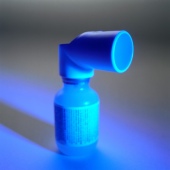
WEDNESDAY, March 27 (HealthDay News) — Certain genetic factors and wheezing early in life are associated with a greatly increased risk of asthma in children, a new study says.
Researchers examined data from nearly 500 children and found that about 90 percent of those who had two copies of a common genetic variation and who also experienced wheezing when they had a cold early in life developed asthma by age 6.
These children, all from families with a history of asthma or allergies, were nearly four times more likely to develop asthma than those who did not have the genetic variation and did not wheeze, according the study in the March 28 issue of the New England Journal of Medicine.
The genetic variation is found on chromosome 17 and is common. Half of the children in the study had one copy and 25 percent had two copies. The researchers also noted that colds are extremely common and affect nearly all infants.
The increased risk is associated with wheezing during colds caused by a human rhinovirus infection, the University of Chicago Medical Center researchers said.
“We found that the interaction between this specific wheezing illness and a gene or genes on a region of chromosome 17 determines childhood asthma risk,” study author Carole Ober, a professor of human genetics at the University of Chicago, said in a medical center news release. “The combination of genetic predisposition and the child’s response to this infection has a huge effect.”
The researchers said it is not clear how this gene variation and wheezing interact to increase the risk of developing asthma. It also should be noted that the research showed only an association between them, and not a cause-and-effect relationship.
About 25 percent of children who had no wheezing from a human rhinovirus infection developed asthma, and 40 percent of those who experienced wheezing in the first three years of life but lacked the risk-related gene variants developed asthma.
That rose to nearly 60 percent among those with one copy of the gene variant and to 90 percent for those with two copies.
More information
The American Lung Association has more about children and asthma.

